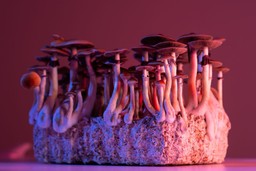Functional mushrooms are fungi that some claim can help with stress and focus. They’ve cropped up in drink mixes, powdered supplements, and functional foods. But do they actually do what people claim they can? If you’re trying them, what precautions should you keep in mind? Let’s discuss the research on functional mushrooms and whether they’re safe.
Reishi, lion’s mane, cordyceps, and ashwagandha are part of a subset of fungi that may help us adapt to stress. This is the idea behind “adaptogens,” substances that help improve well-being. Adaptogens have been used for thousands of years in Traditional Chinese Medicine, Ayurveda, Kampo, and other ancient traditions and are now making their way into consumer products.
When it comes to functional mushrooms, companies claim their products will change your life. Subscription supplements and drink mixes state they’ll help improve your focus, relieve stress, and boost your immune system. But, what does the research say?
Follow your Curiosity
Sign up to receive our free psychedelic courses, 45 page eBook, and special offers delivered to your inbox.At Psychedelic Support, we focus on therapy aided by entheogenic medicines like psilocybin, LSD, and MDMA. We help educate providers and connect people with mental health professionals with vast knowledge of therapeutic interventions, techniques, and plant medicines. Unlike functional mushrooms, these substances create psychedelic experiences that people grow and heal from. Psychedelic therapy has been healing people with depression, PTSD, addiction, and more.
But we also know that adaptogenic mushrooms are on the rise, and we want you to have the best information about them. We’re all about education and arming people with the information they need to make better decisions for their mental and physical health. First, let’s get clear on what these substances are.
What Is a Functional Mushroom?
Functional mushrooms are non-hallucinogenic fungi that may have health benefits and have been around for quite some time. As early as 450 BCE, Hippocrates claimed that the amadou mushroom had benefits, especially as an anti-inflammatory tool for cauterizing wounds. The Ice Man, Europe’s oldest known human mummy, was carrying amadou when he died 5300 years ago1.
Functional mushrooms, also called “adaptogens”, are just as they sound – they help our bodies adapt. The term comes from a Russian scientist who trialed some substances on soldiers in the 1940s. He was looking for a way to boost Soviet troops during the Cold War and used ginseng to do so2. In 1962, the Soviet Ministry of Health declared ginseng the first official herbal medicine. But what mushrooms are considered adaptogens or functional mushrooms?
Which Mushrooms are Functional Mushrooms?
More than 1,000 species of mushrooms may be considered adaptogens. Here are some of the more well-known functional mushrooms:
- Reishi
- Ashwagandha
- Lion’s Mane
- Cordyceps
- Chaga
- Shiitake
Psst… We’ve got a whole guide on functional mushrooms and their properties. Check it out here.
Are Adaptogenic Mushrooms Safe?
Medicinal mushrooms are generally safe, but certain groups should consult their healthcare provider before trying them. These include:3
- People with clotting disorders
- People on blood-pressure-altering medications
- Pregnant people
- People with liver disorders or failure
- Thyroid disorders
Do Adaptogenic Mushrooms Have Side Effects?
Yes, although they’re usually well-tolerated.
Some medicinal mushrooms can have gastrointestinal side effects. These include nausea, diarrhea, and stomach upset, with additional reports of individuals experiencing dry mouth and headaches.
Some specific mushrooms may have their own side effects, and they can interact with other medications. Consult your healthcare provider before starting an adaptogen regimen.
Do Adaptogenic Mushrooms Actually Work? Functional Mushroom Research
While research on dosage and outcomes is still limited, functional mushrooms have shown some benefits. And this research comes after these substances were used for millenniums by ancient peoples, which we can’t discount.
A 2022 literature review yielded about 130 medicinal properties in adaptogenic mushrooms. These properties included:
- Protection from cardiac problems
- Immune modulation
- Antitumor
- Anti-oxidant
- Anti-viral
- Anti-hypertensive
- Liver-protective
But how can mushrooms carry so many valuable properties? The answer is in their diversity. Fungi create diverse bioactive compounds – chemicals that have biological effects within the body. One of these compounds is polysaccharides. These sugar chains, which mushrooms produce thousands of, have shown several beneficial effects on body systems4.
Functional mushrooms also produce medicinal proteins, which can have immune-modulating effects. Terpenoids and Terpenes are also very prevalent in mushrooms and have anti-carcinogenic, anti-infection, and immune-modulating properties.
Research into clinical outcomes is still early, and methodology can tend to be inconsistent, but check out these exciting research outcomes:
- A 2020 review of eight placebo-controlled studies found promising results in cancer patients. Patients benefited from adaptogen therapy through improved quality of life. Participants also showed antitumor effects from these mushrooms through increased activity in natural killer cells5.
- A 2020 trial of patients with Herpes (HSV 1) found that a compound from medicinal mushrooms significantly shortened cough duration6.
- One 2022 trial studying an adaptogen-rich drink mix found good cognitive results in some participants7.
Initial research is promising, and these substances could yield benefits in the future. Trials on adaptogenic mushrooms are still in the early phases. But there’s an extensive list of companies touting adaptogens in their products, along with life-changing claims. For the most part, the dosage of these consumer products is very low, as most likely too low to create noticeable benefits.
Muchlike the supplement market, the adaptogen market doesn’t have to prove that its products do what they say they do. Let’s talk more about the research on these products.
What Do Studies Say About Using Mushroom-Based Supplements?
Not many trials have covered mushroom-based supplements. That’s because these products don’t have to show safety and efficacy before being marketed and sold to the public.
Follow your Curiosity
Sign up to receive our free psychedelic courses, 45 page eBook, and special offers delivered to your inbox.Unlike psychedelic mushrooms, which are currently under extensive clinical testing, adaptogen mushroom supplements don’t have to meet FDA approval. Some of these supplements don’t even include the adaptogens they claim to, leading to the growth, processing, and packaging of these supplements not reaching optimal standardization. So be very careful if you’re looking for medicinal mushroom supplements.
Ultimately, some adaptogens have had specific and measurable benefits in trials. Future research may reveal more. But supplements may not be the way to get these benefits.
Key Takeaways on Adaptogen Safety
Mushrooms come in many forms and serve many different properties. Some give us a psychedelic experience, some are dangerous for consumption, and others make tasty dishes for our tables. Lastly, others could help our bodies recover and deal with stress.
Mushrooms are powerful fungi. Spiritually and physically, they can have strong effects on our bodies. While the research is relatively strong for adaptogens, and risk may be low, we can’t yet make recommendations. Keep in mind that supplements and drink mixes aren’t held to strict approval standards. Proceed with caution when it comes to medicinal mushrooms in products.
Unlike adaptogens, including adaptogenic mushrooms, psychedelics like psilocybin have been thoroughly tested through clinical trials. Strict therapeutic standards and safety precautions will help us deliver psychedelic therapy safely and with extensive research to back up the practice. FDA approval is coming sooner than you may think.
If you’re interested in learning more about psychedelic therapy, subscribe to our newsletter. You’ll get updates on articles like this, our expert speaker series, and fresh courses. Sign up using the link below, and get access to our free courses list.
References
- Stamets P, Zwickey H. Medicinal Mushrooms: Ancient Remedies Meet Modern Science. Integr Med (Encinitas). 2014 Feb;13(1):46-7. PMID: 26770081; PMCID: PMC4684114.
- Liao LY, He YF, Li L, Meng H, Dong YM, Yi F, Xiao PG. A preliminary review of studies on adaptogens: comparison of their bioactivity in TCM with that of ginseng-like herbs used worldwide. Chin Med. 2018 Nov 16;13:57. doi: 10.1186/s13020-018-0214-9. PMID: 30479654; PMCID: PMC6240259.
- What are adaptogens and are they healthy? Cleveland Clinic Health Essentials. (2022, April 13). Retrieved October 17, 2022, from https://health.clevelandclinic.org/what-are-adaptogens-and-what-do-they-do/
- Chugh, R. M., Mittal, P., MP, N., Arora, T., Bhattacharya, T., Chopra, H., Cavalu, S., & Gautam, R. K. (2022). Fungal mushrooms: A natural compound with therapeutic applications. Frontiers in Pharmacology, 13. https://doi.org/10.3389/fphar.2022.925387
- Jeitler M, Michalsen A, Frings D, Hübner M, Fischer M, Koppold-Liebscher DA, Murthy V, Kessler CS. Significance of Medicinal Mushrooms in Integrative Oncology: A Narrative Review. Front Pharmacol. 2020 Nov 11;11:580656. doi: 10.3389/fphar.2020.580656. PMID: 33424591; PMCID: PMC7794004.
- Urbancikova I, Hudackova D, Majtan J, Rennerova Z, Banovcin P, Jesenak M. Efficacy of Pleuran (β-Glucan from Pleurotus ostreatus) in the Management of Herpes Simplex Virus Type 1 Infection. Evid Based Complement Alternat Med. 2020 Apr 13;2020:8562309. doi: 10.1155/2020/8562309. PMID: 32419831; PMCID: PMC7201855.
- Boolani, A., Fuller, D., Mondal, S., & Gumpricht, E. (2022). Trait energy and fatigue modify acute ingestion of an adaptogenic-rich beverage on neurocognitive performance. Applied Sciences, 12(9), 4466. https://doi.org/10.3390/app12094466








